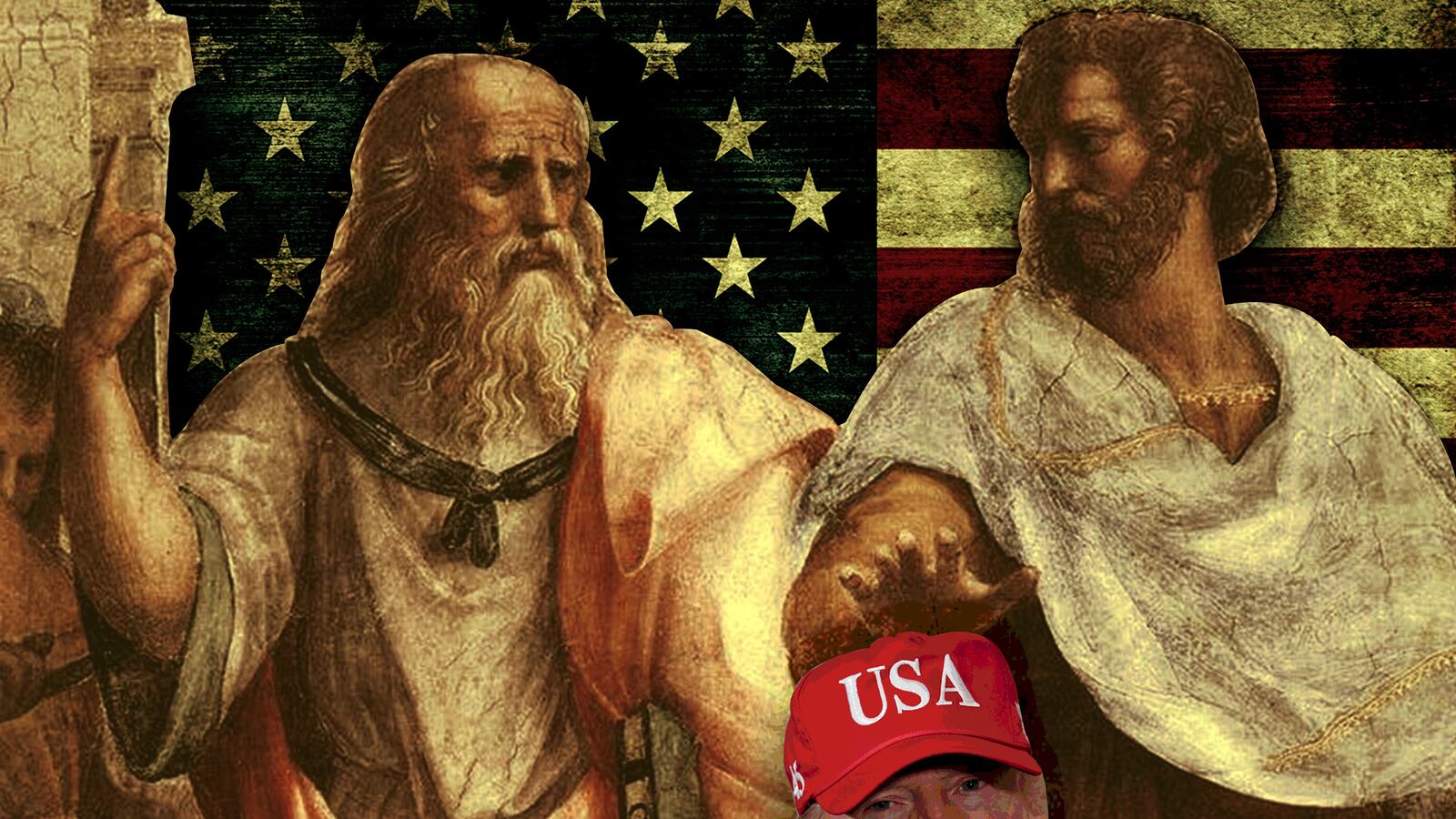Three years after the slaughter of World War II, Scott Buchanan, a philosophy professor and the dean of St. John’s College, suggested an unusual way to avoid future calamities: “In the year 1948 the reading of Plato’s dialogues by a large number of people could make the difference between a century of folly and a century of wisdom for the world.” Based on the past 70 years of history, either the professor overestimated the worldly powers of an ancient philosopher, or not nearly enough people have been reading Plato.
Plato and Aristotle were the first philosophers to systematically analyze the power of rhetoric and highlight its vast potential for abuse. In the years immediately after rhetorically adept dictators had captivated huge swaths of Europe, ancient philosophy seemed an especially relevant field to consult, and it remains an essential resource for anyone interested in understanding what makes rhetoric effective and how to guard against its seductions. The professor from St. John’s may have been exaggerating, but he was not wrong.
The scope of rhetoric’s dangers was already appreciated in antiquity. Boasting about just how much power his lexical finesse confers, a rhetoric teacher in Plato’s Gorgias offers this cynical marketing pitch to prospective students: “Think of a community and I assure you that if an expert in rhetoric and a doctor went there and had to compete against each other for election as that community’s doctor by addressing the assembly or some other public meeting… the effective speaker would win the election. In fact, it doesn’t matter what his rival’s profession is; the rhetorician would persuade them to choose him, and the other person would fail.”
This is the original articulation of a post-fact world. Rhetoric is the craft that makes facts and expertise irrelevant to people’s decisions. It’s the art that masters all others. If the teacher in Plato’s dialogue is right, a sufficiently skilled speaker has the shape-shifting power to appear persuasive in any domain. Rather than pursue the slow work of accumulating real knowledge and expertise about a topic, the rhetorician can simply deploy some subset of his tactics to trounce any real expert. “Rhetoric is the only area of expertise you need to learn,” the teacher boasts in a line that could easily be the motto of the Trump administration. “You can ignore all the rest and still get the better of the professionals!”
If rhetoric is what allows non-experts to dominate experts, and if non-experts make worse decisions than experts, any healthy society must cultivate the ability to detect and resist rhetorically seductive frauds. The question is how.
Aristotle presents his entire Art of Rhetoric as a kind of intellectual self-defense manual. If it’s important to know how to defend your body from physical harm, he says, then it’s even more vital to know how to defend your mind from rhetorical assault. Plato uses the same metaphor of rhetoric as violence. A character in one of Plato’s dialogues protests that a ban on rhetoric teachers would be unfair: no one would blame a boxing instructor if one of his pupils misused his skill and punched his parents. Similarly, the art of rhetoric is morally neutral—capable of good or bad uses—and its teachers deserve no blame for its misapplication.
This metaphor of rhetoric as violence suggests one form of defense: learn the moves deployed by those on offense. Some of the basic rhetorical maneuvers from antiquity are still common: character assassination of opponent (“lock her up!”), strategic distraction of audience (answer a question about sexual assault with a response about ISIS), and arousal of strong pity, fear, hatred, or anger in the audience (the media is unfair, this American carnage, Mexican are rapists, Muslim are terrorists, etc.).
But to see why these ploys do not strike many as transparent attempts at manipulation, it’s important to appreciate just how easily rhetoric can overwhelm reason.
Plato dramatized this dynamic with a simple scenario: imagine a doctor and a pastry maker speaking to an audience of children charged with determining which person knows more about good and bad food. The pastry maker promises an infinity of delicious sweets and treats, while the doctor proclaims the virtues of vegetables and urges moderation in sweets. The children, Plato says, would not only prefer the pastry maker; if given the chance they would also “sentence the doctor to death by starvation.”
With an audience composed of doctors instead of children, the result would be different. Doctors who know better still overindulge in sweets, just as the most informed audience can still be swept along by rousing rhetoric to a conclusion they would not rationally sanction. But the relevant domain-specific knowledge helps to expose rhetorical fraud. Trump speaking to climate scientists about climate change is far less dangerous than Trump speaking to the scientifically illiterate.
The pastry maker is to the doctor what the rhetorician is to the philosopher or expert. Rhetoric concocts pastries for the mind. Catering to the immediate appetites of the uninformed—Mexico will pay for the wall! There will be jobs like you can’t believe!—rhetoric makes verbal confections designed to appeal to the mind in the same way that a delicious pastry appeals to the palate. The genius of this metaphor is its emphasis on pleasure. No one has trouble understanding why even those who know better are often overcome by the pure physical pleasure of eating sweets. Plato’s metaphor suggests that we should regard our minds as equally vulnerable to the seductions of pleasure.
This suggests the limits of fact-checking as a counter to rhetoric. Minds inflamed by the pleasures of rhetoric will not be swayed by data, facts, or arguments. These will be no more persuasive than the admonitions of parents speaking to a child in the grips of a strong craving for sugar. Nutritional science studies the potent and addictive power of sugar, fat, and salt. Plato’s analogy poses an equally urgent question: What are the sugars, fats, and salts of the mind?
Everyone is an intellectual child in their knowledge of certain areas. Because no one is an expert on everything, knowledge can never be an adequate defense against rhetoric. The vulnerability of Plato’s audience of children may not be a lack of expert medical knowledge so much as a lack of cultivated ethical habits. If the audience listening to the pastry chef and the doctor were composed not of ignorant children or adult doctors but some intermediate group of non-expert adults, the scenario would closely resemble a modern democracy.
Despite the best efforts of advertisers, millions of people successfully avoid the seductions of junk food and sugar every day. Most of them do this not because of some deep and expert knowledge of nutrition, but because they have developed good habits. What this means in practice is not that the sweets would not taste good to them, but that they have learned to take pleasure in healthier alternatives. Thus the prospect of the pleasure of sweets does not have the same overwhelming and reason-paralyzing force for them as it does for those who are addicted to sugar.
There’s a basic biological appeal to demonizing other groups, imagining miraculous and instantaneous solutions to complex problems, and feeling a righteous surge of anger against ostensible enemies. Those who can resist the temptations of rhetoric are not necessarily intellectual titans—they’re more like people who have good diets. They are still susceptible to rhetoric, but they have become less so over time.
It’s tempting to think that education is the only adequate defense against the snares of rhetoric. But this is only true in an older sense of education—one that includes moral and ethical training. If reading Plato can help achieve this, then the ancient philosopher really could make a difference between a century of folly and a century of wisdom.





